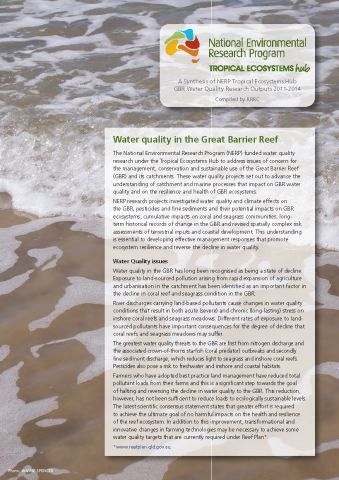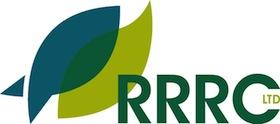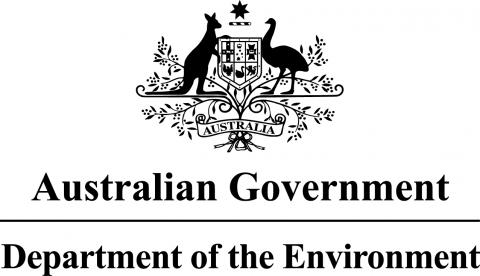Resources
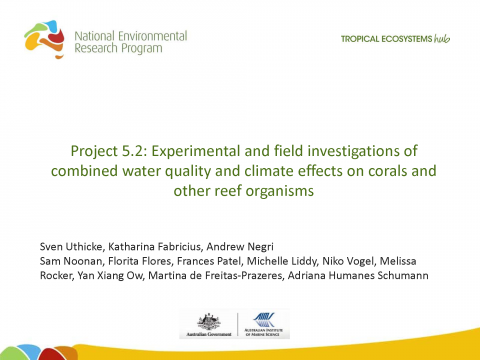 Sven Uthicke (AIMS), Katharina Fabricius, Andrew Negri, Sam Noonan, Florita Flores, Frances Patel, Michelle Liddy, Niko Vogel, Melissa Rocker, Yan Xiang Ow, Martinda de Freitas-Prazeres, Adriana Humanes Schumann; Experimental and field investigations of combined water quality and climate effects on corals and other reef organisms; Thursday 9th May 2013.
Sven Uthicke (AIMS), Katharina Fabricius, Andrew Negri, Sam Noonan, Florita Flores, Frances Patel, Michelle Liddy, Niko Vogel, Melissa Rocker, Yan Xiang Ow, Martinda de Freitas-Prazeres, Adriana Humanes Schumann; Experimental and field investigations of combined water quality and climate effects on corals and other reef organisms; Thursday 9th May 2013.
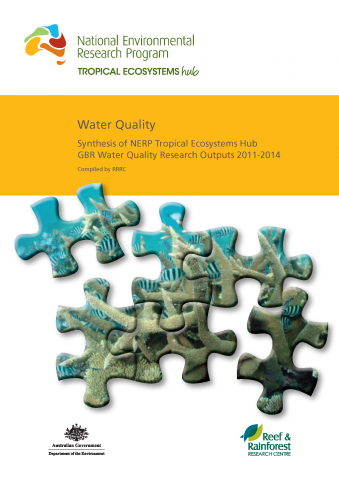 Devlin, M., Fabricius, K., Negri, A., Brodie, J., Waterhouse, J., Uthicke, S., Collier, C., Pressey, B., Augé, A., Reid, B., Woodberry, O., Zhao, J-x., Clarke, T., Pandolfi, J., Bennett, J. (2015) Water Quality - Synthesis of NERP Tropical Ecosystems Hub Water Quality Research Outputs 2011-2014.
Devlin, M., Fabricius, K., Negri, A., Brodie, J., Waterhouse, J., Uthicke, S., Collier, C., Pressey, B., Augé, A., Reid, B., Woodberry, O., Zhao, J-x., Clarke, T., Pandolfi, J., Bennett, J. (2015) Water Quality - Synthesis of NERP Tropical Ecosystems Hub Water Quality Research Outputs 2011-2014.
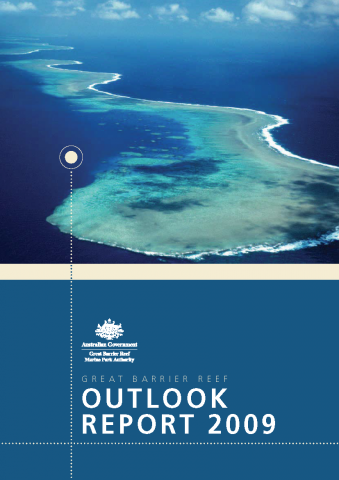 The Great Barrier Reef Outlook Report 2009 is a stock-take of the Great Barrier Reef, its management and its future.
The Great Barrier Reef Outlook Report 2009 is a stock-take of the Great Barrier Reef, its management and its future.
The aim of the Outlook Report is to provide information about:
- The condition of the ecosystem of the Great Barrier Reef Region (including the ecosystem outside the Region where it affects the Region);
• Social and economic factors influencing the Great Barrier Reef ecosystem;
• Management effectiveness of the Great Barrier Reef; and
• Risk-based assessment of the long-term outlook for the Region.
The Report underpins decision-making for the long term protection of the Great Barrier Reef. It was prepared by the GBRMPA based on the best available information and was independently peer reviewed. Many people contributed to the development of the Outlook Report including:
• Australian and Queensland Government agencies
• Leading Great Barrier Reef scientists and researchers
• Industry representatives
• Advisory committees
• Members of regional communities and the public.
The publication of an Outlook Report was a key recommendation of the review of the Great Barrier Reef Marine Park Act 1975. A report is to be prepared every five years and given to the Minister for Sustainability, Environment, Water, Population and Communities for tabling in both houses of the Australian Parliament.
The Great Barrier Reef Outlook Report 2009 is the first of these reports.
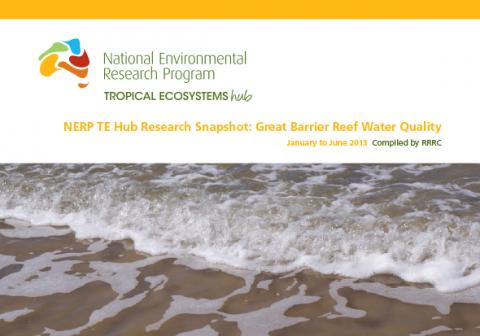 A snapshot of the research progress within the Great Barrier Reef Water Quality node for January to June 2013.
A snapshot of the research progress within the Great Barrier Reef Water Quality node for January to June 2013.
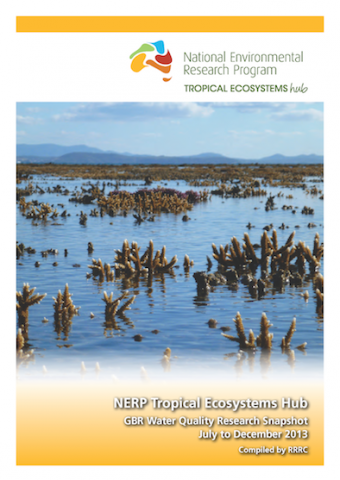 A snapshot of the research progress within the Great Barrier Reef Water Quality node for July to December 2013.
A snapshot of the research progress within the Great Barrier Reef Water Quality node for July to December 2013.
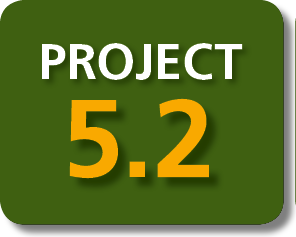
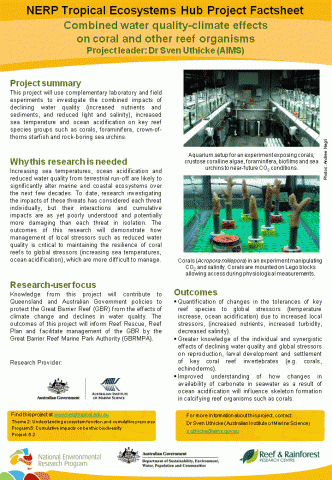 This project will use complementary laboratory and field experiments to investigate the combined impacts of declining water quality (increased nutrients and sediments, and reduced light and salinity), increased sea temperature and ocean acidification on key reef species groups such as corals, foraminifera, crown-of-thorns starfish and rock-boring sea urchins.
This project will use complementary laboratory and field experiments to investigate the combined impacts of declining water quality (increased nutrients and sediments, and reduced light and salinity), increased sea temperature and ocean acidification on key reef species groups such as corals, foraminifera, crown-of-thorns starfish and rock-boring sea urchins.

van Dam, J.W., Negri, A.P., Mueller, J.F., Altenburger, R., Uthicke, S. (2012) Additive Pressures of Elevated Sea Surface Temperatures and Herbicides on Symbiont-Bearing Foraminifera. PLoS ONE. 7 (3), e33900 [doi:10.1371/journal.pone.0033900].
* Funded by DEWHA (MTSRF)

Uthicke, S., Logan, M., Liddy, M., Francis, D., Hardy, N., Lamare, M. (2015) Climate change as an unexpected co-factor promoting coral eating seastar (Acanthaster planci) outbreaks. Scientific Reports. [doi:10.1038/srep08402].

Uthicke, S., Furnas, M., Lonborg, M. (2014) Coral Reefs on the Edge? Carbon Chemistry on Inshore Reefs of the Great Barrier Reef. PLoS One. [doi: 10.1371/journal.pone.0109092].
